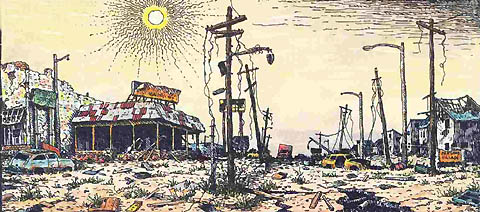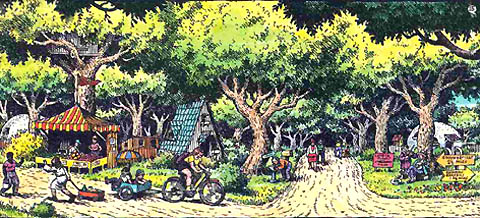Looking Through Peak Oil Lenses
by Tom Whipple on 6 April 2006 Falls
Church News-Press
Once a person assimilates the idea that peak oil and its consequences
are imminent, it radically changes one's world outlook. Nearly every
issue one confronts will be affected by peak oil. In the last 100
years, oil has become so pervasive in our civilization that few
issues or individuals will be immune to the reduced availability
and much higher prices that will soon be upon us.
At the top of the list of problems coming with the peaking of world
oil production are all manner of economic troubles. Optimistic students
of peak oil say, at best, we are going to have a great depression
lasting a couple of decades. Pessimists write of much worse. The
bottom line is the good times much of the world has enjoyed for
the last sixty years will not last long.
Start with the innumerable personal decisions you make every day.
Is your job likely to be an early casualty of rising gasoline prices?
If you make or sell SUVs, the answer is easy. If your job depends
on people's discretionary spending— be wary. The polls tell
us people will spend close to their last discretionary dollar on
gasoline before giving up driving their beloved and "essential"
cars. Thinking of buying or selling a home? The housing situation,
particularly in the US, is going to be markedly different in a few
years.
If, however, you are a farmer (and not many of us are anymore),
you may be on the verge of the golden age. Chances are the world's
farmers are going to be mighty busy growing plants that can be converted
into liquid fuels as well as food. The golden age for some could
start as early as this summer when large quantities of surplus corn
are converted into ethanol for use as a pollution reducing gasoline
additive. On the other hand, it seems some major droughts are shaping
up across the world, possibly even in the US, so the golden age
of farming may be delayed for awhile.
If your part of the world suffers from traffic congestion, just
wait awhile. We know people will give up a lot of things before
they park their cars, but after gasoline gets past $6 or $7 per
gallon and a lot of credit cards start maxing out, "non-essential"
driving is bound to slow way down. Every car you see on the road
will have someplace important to go and I suspect will have more
people on board than we see now.

Robert Crumb cartoon of Worse Case Scenario after
the Peak Oil Crisis
Thinking about
a trip? You had better go soon. The International Air Transport
Association just reported the collective fuel bill for all the world's
airlines topped $92 billion last year, up 50 percent from 2004.
It is not hard to imagine that airfares currently measured in the
$100s will one day be measured in the $1000s, leading to a marked
reduction in air travel.
Currently, one of the top political issues in the US is immigration
policy, so it is fair to ask what insights a peak oil perspective
might have on this issue. There would seem to be two sides. As people
who have been following peak oil are aware, oil production in Mexico
has started into decline and just might decline very rapidly. As
the Mexican federal budget depends very heavily on oil revenues,
Mexico, and indeed all of Central America, may be faced with some
very tough times ahead leading to increased pressures to migrate
north.
In the US, the role for immigrants will largely be determined by
how well the economy fares in the early years of peak oil. As long
as the GDP continues to grow and unemployment is low, there will
be a demand for immigrant labor. However as the economy weakens
from steadily increasing oil prices, laid-off workers will be willing
to take less-desirable jobs, thus displacing immigrants. While some
types of jobs that have come to be filled largely by immigrants
—agricultural and meatpacking— should continue at current
levels. After all, we have to eat. Others, such as construction,
landscaping, hotel and restaurant work, are likely to see a substantial
decline with the advent of a peak oil induced depression.

Robert Crumb cartoon of Ecotopian alternative
to the Peak Oil Crisis
The last point to ponder a bit would be the role of government,
at all levels, in a post peak world. We no longer live in a 19th
century world where most of us lived on farms and could more or
less provide for ourselves. We have become so dependent on elaborate
networks of transportation, energy, and communications to sustain
our lives, and there are now so many of us -- 300 million in the
US, 6.4 billion in the world --- it is clear governments are the
only entities with the authority and the means to get us through
to the post peak oil world.
If you are skeptical of this, ponder 1929 to 1945 and the pervasive
role that government came to play in the economy and our lives during
the depression and the ensuing war. There seems little doubt that
the problems coming with peak oil will be comparable to those of
the 1930s and '40s.
Once you have absorbed the notion that peak oil is both inevitable
and imminent, one's world outlook and perhaps one's politics are
in for a radical change.
|


